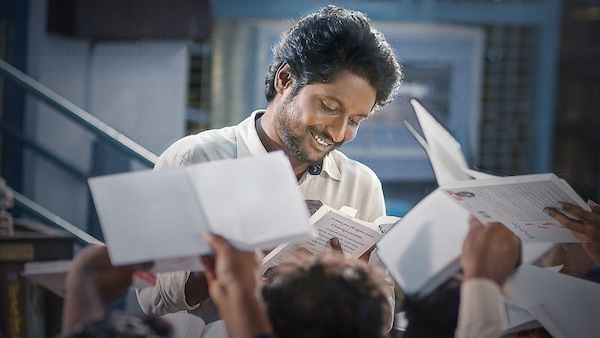Writer Padmabhushan distracts you with the humour, scores big with its ode to motherhood
The USP of director Shanmukha Prashanth’s debut is the clean humour and his earnest efforts to capture the little joys of middle-class life

Last Updated: 05.55 PM, Feb 12, 2023
Deceptive storytelling has become the norm of Telugu cinema lately. Filmmakers are increasingly tempted by the idea to preserve the twist of their story for the final stretch to ensure audiences leave the theatres on a high. In films like Ante Sundaraniki, Brochevarevarura, F2: Fun and Frustration and the recent Mukhachitram, the first hour beats around the bush, builds complex subplots but by the time you reach the third act, you realise you’ve been fooled all along.
Debutant director Shanmukha Prashanth in Writer Padmabhushan too borrows a leaf out of the aforementioned narrative structures. While centring his plot around a struggling writer, he packages an intelligent screenplay filled with confusion comedy, only to pay an emotional tribute to motherhood in a tear-jerker of a climax. He’s clearly a filmmaker who understands the pulse of audiences, the importance of ending a film well and ensures a neat transition from humour to drama.
Much like Sekhar Kammula and Basu Chatterjee, the director appears to be an ardent admirer of the middle-class lifestyle and the little joys of ordinary living. While there’s nothing to debate about this perspective, he could’ve done with less sugarcoating. Writer Padmabhushan goes a little too far in glorifying the innocence of a middle-class dad, how he celebrates saving Rs 8000 a month, the occasional jewellery purchase or hiring a cab to attend a wedding .
The comedy sequences are set up with taste, the ideas are funny though the result isn’t always explosive. Had the director paid more heed to the translation of his ideas onto the screen, Writer Padmabhushan would’ve been funnier. Yet to his credit, in most sequences, you laugh with the characters and not at them. The film also makes commendable use of the Vijayawada setting - the simplicity of its world adds another layer to the story.
It’s Suhas earnestness and terrific improvisation that infuses life into ordinary sequences that unfold at the library and several locations with his love interest. Much like his father’s part, his innocence is the lifeline of this story. Both the female leads Tina Shilparaj (Sarika), Gouri Priya (Kanna) get parts that are shorn of depth (the former in particular). It’s hard to buy Sarika’s fondness for Padmabhushan - their romance is riddled with too many commercial liberties.
You also wish the creators made a better effort to understand the mental makeup of a writer; writing seems more like a mathematics formula that the protagonist is trying to decode. You neither sense his love for the language nor the urge to express nor observe life beyond the obvious. Shanmukha Prashanth still never lets these hiccups overpower the narrative and handles the change of tone efficiently in the final hour.
The idea to celebrate the sacrifices of a middle-class homemaker works like a beauty in the climax, though the execution could’ve been less preachy. The filmmaker treats the mother’s character more like a set property for a major part of the film and does a U turn in the finale (which is clearly the reason why Rohini Molleti would’ve said yes to the role). Unlike regular mainstream films, here the male lead is at least secure enough to let Rohini take the centrestage in a scene.
Ashish Vidyarthi enjoys the departure from his usual dark, brooding avatars to play a simple, innocent father though it still doesn’t explain why he was cast for it. A native actor would’ve easily added more charm and rootedness to the part. The likes of Goparaju Ramana, Ashok Kumar sleepwalk through their roles. Suhas is indeed a fine talent but one could sense a body language pattern creeping into his performances he should be wary of.
Writer Padmabhushan appears like a passable dish in a meal for a major part, but it ensures a lovely aftertaste.

 Premium
Premium